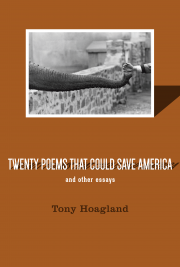 I have been reading Tony Hoagland’s newest book of essays, Twenty Poems that Could Save America (published by Graywolf Press, a wonderful imprint). In his first essay, “Je Suis ein Americano: the Genius of American Diction,” he talks about the current direction of American poetry, the experimentation, the fractured language and syntax, the shifts and ruptures of trying to cobble together something fresh. This is the final paragraph:
I have been reading Tony Hoagland’s newest book of essays, Twenty Poems that Could Save America (published by Graywolf Press, a wonderful imprint). In his first essay, “Je Suis ein Americano: the Genius of American Diction,” he talks about the current direction of American poetry, the experimentation, the fractured language and syntax, the shifts and ruptures of trying to cobble together something fresh. This is the final paragraph:
“American English is a great experiment in progress, and American poetry is its laboratory on a hill. Several decades ago, Tim Dlugos published a chapbook of poems with the title Je Suis ein Americano, as if making the point of this essay in brief. I suppose the mythic analog might be the story of Frankenstein’s monster. The creature we know as Frankenstein is patched together by a mad doctor, who employs a cut-and-paste method using the recycled parts of executed criminals. The monster escapes, descends from the mountain, and terrorizes the villagers. It sounds a lot like postmodernism, doesn’t it? Yet the big, interestingly fabricated fellow is trying to communicate something—maybe he just wants a hug, but he can’t make himself understood to the frightened townspeople. Their natural-enough tribal reaction is to try to kill him. In American poetry, too, the boundary between the natural and unnatural continues to shift, and American poets keep pushing the limits, searching for a creation at once wide awake and divine.”
So for today, here’s a poem by Dean Young. He plays with set phrases, awkward translations, myths, and most of all expectations. Don’t worry about making sense of it (though I think it has a delightful, deep, cumulative logic). Just revel in his surprising images and word choices, which are always fresh:
Changing Your Bulb
I disconnect the power for at least
five minutes until your bulb is cool
and no longer producing song through
small chewing devices at the end
of its beak. Clunk goes the tipped-over
pounce-meat. When I change your bulb,
am I really changing my own? This concludes
these opening remarks. Later you will be asked
to repeat them as a test of metal decay.
Now take your steel ring by any sharp
of tool at place of two gap or at least
that’s what the instructions say.
Maybe you were made in Tunisia.
I have loved you longer than my one life.
In the north, Siegfried rests after his hunt.
The new adults go into summer hibernation,
called aestivation but we are just waking.
Wing-wear: always a troublement, but there,
in the Wild Valley and Forest of the Rhine
your new bulb gets installed, acting mainly
as an exacerbation to fuzzy brain function.
I feel like I’m approaching a cliff wrapped
in an enormous kite, cheery as life insurance
and I can’t be sure if the statuary
is of rich citizens or supernatural forces.
Finite is our sadness upon this earth she-bob.
Smoke is the voice uh-huh, hammer the moment
sha-la, one magic sleep ends beginning another.
So I insert your glass shield back into your reflector
and it is like you have never been gone.
In the distance, Valhalla is burning
and the old gods calmly await their pupation
in unprotected crevices. There is a part
of the spirit that cannot be destroyed.
Dean Young
And if you’re still with me, here’s a poem I wrote, inspired by Dean Young, though I will never be in his league! It will appear in the upcoming issue of California Quarterly, a publication I’m so pleased to be part of.
Part of the Spirit
There is a part of the spirit that cannot be destroyed.
Dean Young
But which part? The part that makes you pull over
to help the couple stranded by the side of the road,
or the part that’s relieved when they don’t need you?
The part that obsesses over poisons and global warming
or the part that rejoices as dawn slowly illumines the canyon?
Or is it the snatch of song that lingers
in the man you taught as a boy
so that he thinks of you
as he sits at the keys
and his fingers remember?
And what, even, is spirit?
Something not subject to decay,
that shifts, changes,
can’t be held? the way a wave
can lift, drift, expand and brighten,
grind to sand?
iridescent, evanescent?
A touch that gives comfort
even after the hand is gone.
Meryl Natchez